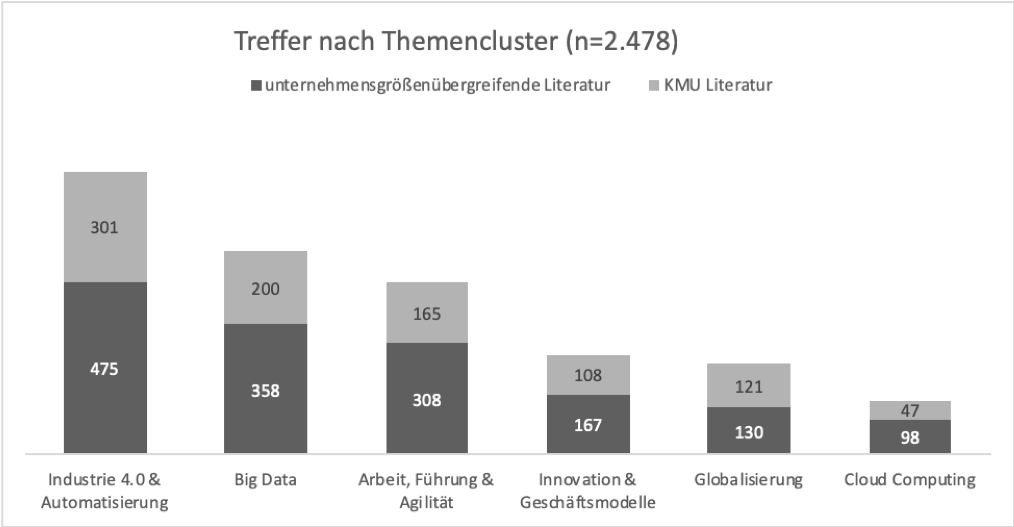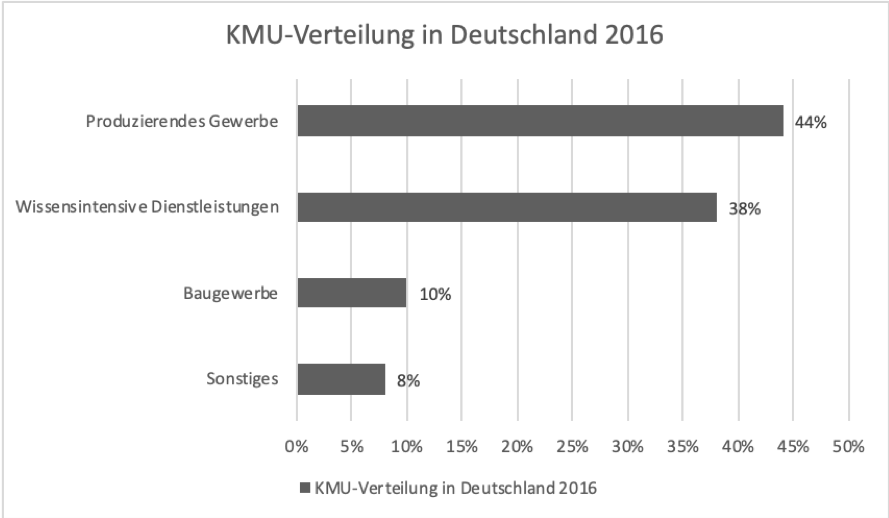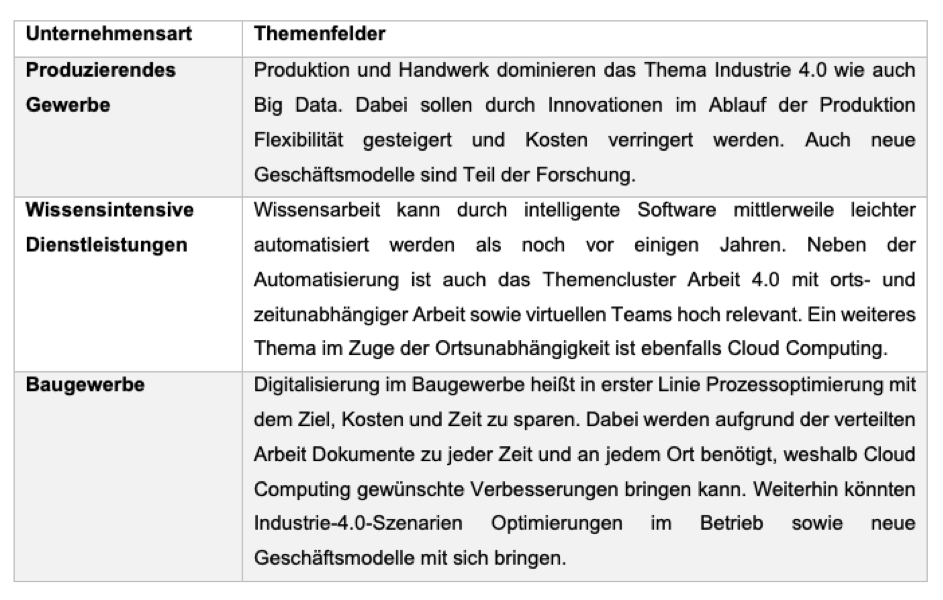Digitization is a very broad field and often hardly tangible. From handling data to networking people and machines, the range is very large. As I already did in my Article on digital transformation mentioned, digitization has a major impact on the state, private individuals, individuals, education and companies. With this article, my aim is to give practitioners an overview of the 6 largest subject areas of digitization and give students tips for their thesis.
Practical benefits
For you as a practitioner, the topics are primarily provided Line an overview. From this you can choose which of the subject areas Could have relevance for your company. It is clear that not everyone Topic can be relevant in every company.
Benefit for students
As a student, you are certainly still looking for a topic for your thesis. I recommend defining a broad topic area in my article at the beginning. This should be one of the 6 mentioned fields. You can then use this Start a literature analysis in the field .
Extensive scientific study
This article is based on the scientific study by Lindner and Leyh (2019) . In order to identify the topic clusters in the course of the digitization of companies, current publications on the digitization of companies were searched for in academic databases, categorized and equivalent content was summarized.
The hits were subsequently reduced and the contents summarized in thematic clusters. These Clusters are then evaluated and displayed. Of course there is still other fields, but I didn’t want this analysis to be too big either to let.

Topics of digitization
In this section I briefly explain the subject areas that I was able to derive from the study. I only treat the fields very generally and roughly. For specific research questions and recommendations for action, please refer to the original study. I’ll be happy to send you the link: just write me a short email.
Industry 4.0 and automation
Digitization offers numerous new opportunities, as well examined in the context of production systems and machines (Lindner and Leyh 2019). According to the study, Industry 4.0 is a marketing term that so-called fourth industrial revolution describes and this with the influence digital technologies in production. This also increases with it intelligent digitization the possibilities of complex tasks, especially in to fully or at least partially automate knowledge work.
Possible questions are the scenarios for the design of Industry 4.0 and the effects of increasing automation.
Big data
The term “big data” describes the handling of large amounts of data in the context of companies (Niebler and Lindner 2019). Be there various topics around the identification, evaluation and use of very large amounts of data discussed. These Data can be sent from sensors, mobile phones, machines, customer cards, vehicles, come from social media and many other sources and must be due to the large quantities are stored, processed and evaluated using special procedures become (Lindner 2019). This data offers companies potential for new ones Business models, markets, job profiles and many other advantages.
Possible questions are the potential of data in companies and the influence on companies as well as questions about data protection and new job profiles.
Work, leadership and organization
The digitization of the world of work is under the catchphrase Work 4.0 predominantly in German and under Smart Working in international Literature discussed (Lindner 2019). The content of the term is according to the Study new work models, agile methods and office concepts with a focus on Implementation in large corporations. The central question is the granting of a higher one Autonomy in terms of selection and use of IT as well as in terms of location and Allow time for work to be done (Lindner and Leyh 2019). It is there also a challenge for executives working with complex and dynamic project tasks that conveyed through modern information and Communication technologies are processed to ensure.
Possible questions are the effects of digitization on employees and the increasing challenges for managers.
Reading tips :
Innovation / business models
Current technological developments offer numerous new opportunities for innovations and business models in companies (Lindner and Leyh 2019). According to the study, this discussion has been continued for many years on the basis of constantly changing technologies such as cloud computing, 3D printing and intelligent systems. The challenge lies in the procurement of suitable IT and its exploratory testing in day-to-day business, since not every new business model or innovation is automatically a guarantee for new markets and increased sales (Lindner and Leyh 2019).
Particular questions are the new possibilities for business models through digital technologies as well as exploratory testing.
Reading tip: Business models
globalization
The study understands globalization in the context of companies von Lindner and Leyh (2019) cross-border or worldwide activities that lead to competitive advantages by exploiting location advantages should. Establishment is a key point in the current discussion sufficient ICT technology for global cooperation.
Special questions are the new possibilities to work together independent of time and place.
Reading tip: Virtual teams
Cloud computing
Under the cloud Computing will take advantage of Technologies for making resources available dynamically, understood (Lindner and Leyh 2019). Meanwhile far more companies are trying out cloud computing internally than a few years ago (Lindner and Leyh 2019). The results of the Topic clusters indicate greater flexibility in scaling IT as well also towards increasing agility. For this reason, many studies investigate use cases for use and Integration of cloud computing in companies as well as data protection.
Particular questions are the new possibilities offered by cloud computing.
Reading tip: Cloud computing
Relevance of the subject areas
The following figure shows the distribution of SMEs in Germany. This stands somewhat symbolically for the distribution of the companies. It is important to research each division separately. It is clear that not every topic is relevant for every area. For example, I have knowledge-intensive skills Services explored.

So, as a practitioner, you should get the issues out of the box Consider your company and as a student also a meaningful one Make a separation according to research object or practice partner.
In a nutshell, manufacturing companies are, for example, automotive suppliers, iron manufacturers, mechanical engineering and traditional handicrafts. Knowledge-intensive services are, for example. IT consulting, software development, insurance, recruitment or financial consultancy and the construction industry should be self-explanatory. All three groups have different requirements and framework conditions. It is important to present this in the strategy development or the thesis, e.g. The networking of machines is more important in production and software support for complex tasks or virtual teamwork is relevant in knowledge work. In the following, I will evaluate the subject areas for relevance. This is my personal assessment and serves as a guide.

For example, with this method I found the topic of my doctoral thesis. To this end, I made a roundtable and invited managers from knowledge-intensive SMEs and asked them: Which of these topics should I research? The 12 managers have agreed on work, leadership and organization. For me, on the one hand, the practical relevance and the fact that enough literature was available was ensured.
Reading tip: Find a topic for doctoral thesis

Original sources
Lindner, D. (2019). SMEs in digital change – results empirical studies on work, leadership and organization . Wiesbaden: Springer Gabler.
Lindner, D. & Leyh C. (2019). Digitization of SMEs – questions and recommendations for action as well as implications for IT organization and IT service management. HMD – Practice of Business Informatics , (4), 19.
[fotolia]


